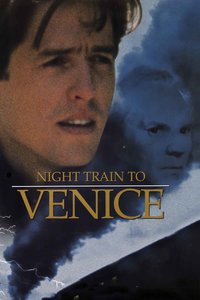Night Train to Venice (1993)
US Title: Train to Hell

In short, journalist Martin (Hugh Grant) travels on the Orient Express to Venice to deliver his powerful manuscript exposing the neo-Nazi movement under the watchful eye of a mysterious stranger (Malcolm McDowell) who may—or may not—be linked to four violent skinheads who’re also on the train.
While this summary certainly wouldn’t breach any Trades Descriptions laws, it doesn’t remotely explain just how truly bizarre and awful this film is. For a start, it doesn’t mention the fact that Martin is Scottish. Actually, this is an assumption on my part. There’s no reason plot-wise why Martin should be Scottish, but Hugh Grant has inexplicably chosen to channel the spirit of every bad Sean Connery impersonation through his accent. As for his explosive manuscript, this is something you have to take on trust, as Martin tells us nothing about it.
The neo-Nazi thugs on the train are the most camp skinheads you’ll ever find on film, outside a documentary exploring the world of gay leather bars. And the other train passengers are no more realistic. There’s a fading dancer with an entourage of drag artistes and some effeminate middle-European playboys who has absolutely nothing to do with the plot at all. Tahnee Welch (daughter of Raquel and former star of Coccoon) plays an Italian actress who is plagued by visions of her daughter falling to her death from the ledge of a tall building.
Grant and Welch’s characters have a quite robust but entirely unerotic sex life. Having only just met, they have sex at least twice on the train before she takes him back to her house in Venice where they have sex again, after which our Hugh nips out for a few minutes to deliver his manuscript to a publishing house ominously called Inferno.
Now, Inferno should have been his first clue, but Hugh’s character is not as smart as you’d expect someone who’s written a book with big words to be. As he wanders down along the docks, into the most derelict warehouse complex imaginable, you’re mentally screaming at him to turn around. Even assuming that a publishing house was actually located in this hell-hole, no-one would want their manuscript published by a business which has more rats than staff, surely?
Hugh gets attacked by the Nazis, who somehow manage to crash into a petrol tanker in the most desolate spot on earth, and promptly loses his memory. Ignoring the fact that he also takes most of the skin off his face but appears entirely unblemished the following day, we have to endure cringe-worthy scenes of Hugh moping around Tahnee’s palatial home pondering aloud, “Martin - who is Martin?” This 8-minute montage is to the tune of Antonini’s Adagio, which is the best thing in the whole film.
I won’t spoil the ending for you, but it doesn’t take a genius to work out that Hugh gets his memory back helped, no doubt, by Tahnee’s naked recuperation efforts.
Grant made a fair few of these films when he started out and refers to them as Euro-puddings, given that they’re usually financed by several countries. And it’s always a possibility that the majority of the cast are there through the patronage of a producer or investor with whom they are intimately involved, because there’s no other reason for casting so many actors who just cannot act in one movie.
Every penny invested in this film—and there were few—are on the screen. The director has clearly been given money for two main establishing shots: one of the outside of the Orient Express, the world’s most famous train, and one aerial shot of Venice from a helicopter. He’s clearly proud of this footage, as views of both account for what seems like 20 minutes of the mercifully brief 71 minute running time. Shots of the train are even cut into the middle of passages of dialogue for no discernable reason.
They obviously spent the rest of the budget on the main theme, an insipid ballad which is woeful, even in terms of German pop music. It’s featured twice in full. There’s also a rendition of Je Ne Regrette Rien by one of the drag acts.
There’s a malevolent quality to the whole enterprise that makes you wonder if there isn’t a darkened room somewhere where a man is strapped to chair, his eyelids kept permanently open, forced to watch this drivel in the hope that long-term exposure to such relentless inadequacy will turn him into the ultimate killing machine so sought after by shady governmental agencies. The really sad thing is that I am certain that this is by no means the worst film that Malcolm McDowell has ever been associated with and that, in itself, should be considered a crime.